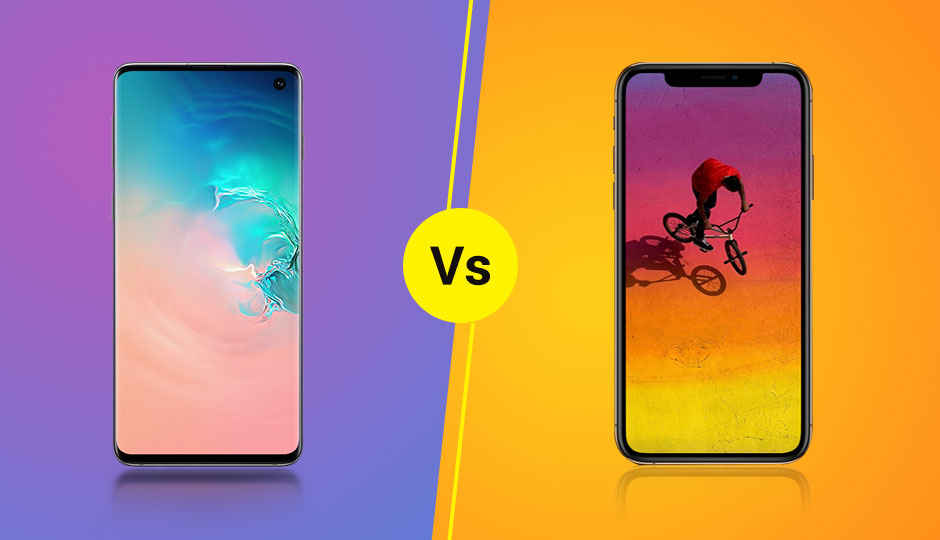 Samsung announced its newest range of flagship smartphones at its Galaxy UNPACKED event in San Francisco yesterday and we were left stunned. The Korean electronics giant announced as many as five new devices, with one being its much-awaited foldable smartphone, the Galaxy Fold. The other three belong to the new S10 line-up: the S10, S10+, and S10e. Today, however, let’s compare the specs of the Galaxy S10 against those of its biggest competitor, the Apple iPhone XS. Note that this is a spec-based comparison and not a full-fledged shootout between the two models. We’ll learn more about the Samsung Galaxy S10 once we get our hands on it for a review. Display and Design Let’s begin with the design of the new Galaxy S10 and the iPhone XS. While the iPhone sticks to the design of the original iPhone X by retaining that wide notch on top of its display, the Galaxy S10 goes in for an Infinity-O design, which means the Galaxy S10 has a single pin hole for the selfie camera on the upper right corner of the display. The rest of the curved display stretches all the way to the phone’s edges and bit beyond. The Galaxy S10 gets a 6.1-inch Dynamic AMOLED display with a Quad HD+ resolution and a 19:9 aspect ratio. In comparison, the iPhone XS gets a smaller 5.8-inch display with a resolution of 1125 x 2436 pixels. Unlike iPhones of the past, the iPhone XS uses a Super AMOLED panel to create high contrast. The Galaxy S10 hides an ultrasonic fingerprint scanner under the display but the iPhone chooses to go with Face ID alone. Performance Though the Samsung Galaxy S10 is powered by a region-specific chipset setup, the chipset announced at Galaxy UNPACKED was the 7-nanometre 64-bit Exynos 9820 chipset, whose fastest core clocks in at 2.8GHz max. The iPhone XS, on the other hand, employs Apple’s proprietary A12 Bionic chip. Though Apple chooses not to go into detail about its numbers, iPhones generally display great performance, and the iPhone XS is no different. In our review, it scored 4692 on Geekbench 4’s single-core test and 10997 on its multi-core test. We’ll have to review the Galaxy S10 to see how it stands up against the iPhone XS but we’re confident its multi-core test score on Geekbench 4 will cross the 10,000 mark. Camera Samsung has equipped the Galaxy S10 with not two but three cameras on the back. The first is a 12-megapixel telephoto camera with phase-detection autofocus and an aperture of f/2.4. The second is a 12-megapixel wide-angle camera with a 77-degree field of view and an aperture of f/1.5. The third and last camera is a 16-megapixel ultra-wide unit with a 123-degree field of view and an aperture of f/2.2. The selfie shooter is a single 10-megapixel sensor with an aperture of f/1.9. In comparison, the iPhone XS has two 12-megapixel cameras on the back. One is a wide-angle camera with an aperture of f/1.8 and the other is a telephoto camera with an aperture of f/2.4. The iPhone XS’ display notch houses a single 7-megapixel TrueDepth selfie camera with an aperture of f/2.2. Memory and Storage The Galaxy S10 has 8GB of LPDDR4X RAM. Storage onboard goes up to 512GB internally. It can be expanded up to 512GB using a microSD card, bringing the total available storage up to a terabyte. Apple generally doesn’t say how much RAM the iPhones come with. Still, we believe the iPhone XS comes with 4GB of it. Storage goes up to 512GB internally but that’s it. There’s no way of expanding storage on the iPhone XS. Battery The Samsung Galaxy S10 comes with a 3,400mAh battery, while the Apple iPhone XS comes with a 2,658mAh battery. Though it’s still too early to call a winner here in the battery department, we believe the Galaxy S10 with its larger battery could last longer than the iPhone XS. We’ll know for sure only when we review the phone. While the Galaxy S10 gets a USB-C port, the iPhone XS sticks to its proprietary Lightning connector.
Samsung announced its newest range of flagship smartphones at its Galaxy UNPACKED event in San Francisco yesterday and we were left stunned. The Korean electronics giant announced as many as five new devices, with one being its much-awaited foldable smartphone, the Galaxy Fold. The other three belong to the new S10 line-up: the S10, S10+, and S10e. Today, however, let’s compare the specs of the Galaxy S10 against those of its biggest competitor, the Apple iPhone XS. Note that this is a spec-based comparison and not a full-fledged shootout between the two models. We’ll learn more about the Samsung Galaxy S10 once we get our hands on it for a review. Display and Design Let’s begin with the design of the new Galaxy S10 and the iPhone XS. While the iPhone sticks to the design of the original iPhone X by retaining that wide notch on top of its display, the Galaxy S10 goes in for an Infinity-O design, which means the Galaxy S10 has a single pin hole for the selfie camera on the upper right corner of the display. The rest of the curved display stretches all the way to the phone’s edges and bit beyond. The Galaxy S10 gets a 6.1-inch Dynamic AMOLED display with a Quad HD+ resolution and a 19:9 aspect ratio. In comparison, the iPhone XS gets a smaller 5.8-inch display with a resolution of 1125 x 2436 pixels. Unlike iPhones of the past, the iPhone XS uses a Super AMOLED panel to create high contrast. The Galaxy S10 hides an ultrasonic fingerprint scanner under the display but the iPhone chooses to go with Face ID alone. Performance Though the Samsung Galaxy S10 is powered by a region-specific chipset setup, the chipset announced at Galaxy UNPACKED was the 7-nanometre 64-bit Exynos 9820 chipset, whose fastest core clocks in at 2.8GHz max. The iPhone XS, on the other hand, employs Apple’s proprietary A12 Bionic chip. Though Apple chooses not to go into detail about its numbers, iPhones generally display great performance, and the iPhone XS is no different. In our review, it scored 4692 on Geekbench 4’s single-core test and 10997 on its multi-core test. We’ll have to review the Galaxy S10 to see how it stands up against the iPhone XS but we’re confident its multi-core test score on Geekbench 4 will cross the 10,000 mark. Camera Samsung has equipped the Galaxy S10 with not two but three cameras on the back. The first is a 12-megapixel telephoto camera with phase-detection autofocus and an aperture of f/2.4. The second is a 12-megapixel wide-angle camera with a 77-degree field of view and an aperture of f/1.5. The third and last camera is a 16-megapixel ultra-wide unit with a 123-degree field of view and an aperture of f/2.2. The selfie shooter is a single 10-megapixel sensor with an aperture of f/1.9. In comparison, the iPhone XS has two 12-megapixel cameras on the back. One is a wide-angle camera with an aperture of f/1.8 and the other is a telephoto camera with an aperture of f/2.4. The iPhone XS’ display notch houses a single 7-megapixel TrueDepth selfie camera with an aperture of f/2.2. Memory and Storage The Galaxy S10 has 8GB of LPDDR4X RAM. Storage onboard goes up to 512GB internally. It can be expanded up to 512GB using a microSD card, bringing the total available storage up to a terabyte. Apple generally doesn’t say how much RAM the iPhones come with. Still, we believe the iPhone XS comes with 4GB of it. Storage goes up to 512GB internally but that’s it. There’s no way of expanding storage on the iPhone XS. Battery The Samsung Galaxy S10 comes with a 3,400mAh battery, while the Apple iPhone XS comes with a 2,658mAh battery. Though it’s still too early to call a winner here in the battery department, we believe the Galaxy S10 with its larger battery could last longer than the iPhone XS. We’ll know for sure only when we review the phone. While the Galaxy S10 gets a USB-C port, the iPhone XS sticks to its proprietary Lightning connector.
from Latest Technology News https://ift.tt/2T5o20d
from It Tech Technology https://ift.tt/2XqqIVA https://ift.tt/2SiEK7E
